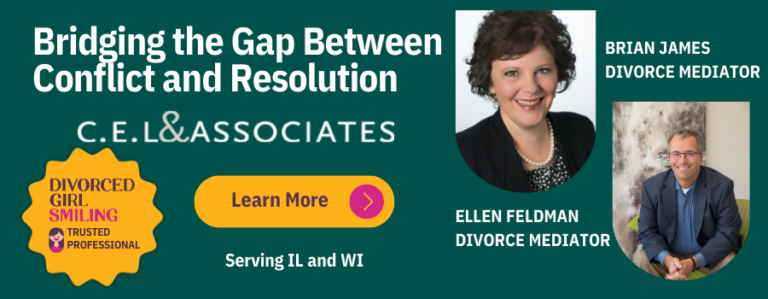When I speak to potential clients, they have lots of questions. One in particular involves co-mediation; what is it and how does it make our practice unique? Having been part of the co-mediation practice, CEL & Associates, (with my business partner, Brian James) since 2007, I can answer that question, and also tell you that there are many advantages to co-mediation.
What is co-mediation?
It is the divorce mediation process in which there are two or more mediators, who in some way complement each other. That could mean that each person has different credentials, backgrounds, experience, or is of a different gender.
In addition to our gender differences, Brian and I complement each other in that we come from different professional backgrounds and have different experiences relating to divorce and the law—both that we know benefit our clients.
The benefits of co-mediation are numerous. The first is that you are getting two mediators for the price of one. On a side note, other co-mediators charge double—a separate hourly cost for each mediator. Brian and I do not do that. Secondly, you are getting two views on many issues, and in our case, a man and a woman bouncing ideas off each other. This has proven time and time again to be an added benefit for both spouses.
How do these benefits actually play out on a practical level? Here are a few details that may be important to you when deciding how you want to get divorced:
1. Brian and I come from different professional backgrounds.
He was a probation officer in the court system working with high conflict domestic violence families. His background is in Psychology and Sociology and he understands the emotional part of the divorce process, the piece that is not “black and white”.
I worked as a Commercial Litigator for 15 years and understand what happens when you go to court. It is expensive and nobody really “wins,” depending how one defines what “winning” really means. I also understand the expense, time and emotional burden of resolving disputes in court. Though I knew when I was in law school that I did not want to practice divorce law where I would be fighting in court about money and children, divorce mediation helps people through a process that focuses on the best interests of their children. My legal background assists our clients when we talk about their children and helps them focus on what is really important and beneficial. We keep our couples from litigating in court and facilitate agreements that make sense and feel fair and equitable for their family as a whole.
The fact that we come from different professional backgrounds means we have different perspectives on many issues and we each have our own view of what may be an effective resolution to a problem. I do volunteer mediation in Lake County, so I know how judges will rule on certain issues and the arguments attorneys will make to encourage their clients to fight. Brian’s professional experience gives him the expertise to caution our clients against fighting and he will talk about how the future will be for their children if they litigate in court, what it will do to them as co-parents, and that how they act during the divorce process sets the stage for many years to come.
The two of us as a co-mediation team enable our clients to see there is often more than one way to resolve an issue. For one issue, they might not like my idea but they might be receptive to Brian’s idea, and vice versa for the next issue. Sometimes, the best resolution may be one that neither of them thinks is ideal but both are able to understand how it makes sense and is good for their family. With the exception of Child Support, Maintenance and how the paying of shared children’s expenses is split, most issues can be resolved through creative agreements. These are agreements that are unique to each family with whom we work. Co-mediation gives our clients the ability and opportunity to be creative while finding solutions that work for both of them and their children.
2. We try to take the emotions out of the process and try our best to have our clients view the process as a business deal.
While we certainly understand there are many emotions involved in getting divorced, and we cannot take those away, emotions are best suited for a therapist. Mediation is about getting the best financial and lifestyle result for your family. Since Brian and I try to mirror good communication for our couples, communicating respectfully with each other, bouncing ideas off one another, and most importantly, listening to each other when the other one is talking, we hope that encourages our clients to do the same. Co-mediation is forward-focused and we try our best not to let the couple dwell on what brought them to divorce. While the past may be relevant to help us resolve an issue, it typically has little or no bearing on the decisions and the future.
3. We always talk about the importance of adhering to the agreements reached in mediation.
With mediation, spouses are more inclined to honor their obligations, much more so than if a judge must tell them what to do regarding their parenting plan, division of assets and financial commitments. Couples who participate in mediation during the divorce process are less likely to experience post-decree conflict as new issues arise, leading to fewer court appearances, reduced attorneys’ fees, and a better overall relationship (which ultimately benefits the children).
4. One of the biggest benefits of mediation is improved communication.
Mediation is hard work. You need to be able to advocate for yourself since, most of the time, no attorney is attending mediation to speak for you. Learning to stay calm and speak about facts helps the couple solve problems in the future. Mediation sessions gives divorcing couples practice so they are not afraid to speak up for themselves going forward. When couples learn to communicate, they stand a better chance of honoring decisions about holidays, parenting schedule and finances, and focusing on being the best co-parents they can be for their children.
5. Cost and value are huge advantages to our co-mediation model.
We charge one hourly rate and split it between the two of us. We are both at every meeting. There are mediation teams we know where the mediator with the financial expertise is at the meetings where finances are being discussed and the parenting expert is at the meetings to discuss parenting responsibilities, schedule and holidays. What if someone wants to discuss something not technically on the agenda for a specific meeting? What happens when finances and parenting overlap? What if the financial mediator has critical information for the parenting agreements, but never shares it with the parenting mediator because they did not know it was needed? We do not care what order the issues are discussed as long as all are resolved by the end.
It takes some of the stress out of the process if both Brian and I are at every meeting to discuss whatever comes up. We also tell our clients we are available for short telephone calls, emails or texts in between meetings, all free of charge. We pride ourselves on being available to our clients whenever they need us, without charging them every time they communicate with us.
In closing, co-mediation is, in my opinion, the best way to get divorced. It eliminates multiple court appearances, a contentious battle, the loss of decision-making power, and high attorneys’ fees. Co-mediation will help ensure a positive resolution to a very emotional process, leaving you with a better post-divorce relationship and overall post-divorce life. We are here to help you if you’d like a complimentary consultation.

Ellen Feldman has been working as a mediator since 2007. A graduate of Smith College and Indiana University School of Law, Feldman previously worked as an attorney for 15 years practicing commercial litigation. Since 2006, Ellen has been a volunteer for The Lilac Tree, an Evanston based nonprofit organization assisting women through the process of divorce. Additionally, Feldman completed Family and Divorce Mediation Training through DePaul University Center for Conflict Resolution and Advanced Family Mediation. She is a court-approved mediator for the 19th Judicial Circuit Family Court of Lake County. Learn more by visiting the C.E.L. & Associates website.




















